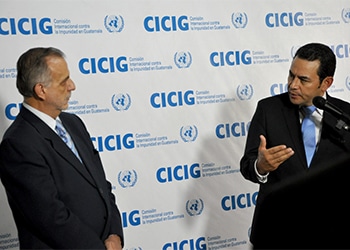A dispute over the legitimacy of an independent anti-corruption body in Guatemala has landed in Washington, where a special hearing recently examined the confusing case of the graft-fighting body’s alleged persecution of a Russian family at the behest of Vladimir Putin.
The latest chapter in the battle over corruption in Guatemala pits entrenched elites — represented by President Jimmy Morales and the recently deceased Guatemala City Mayor Álvaro Arzú — against the International Commission Against Impunity in Guatemala (Comisión Internacional Contra la Impunidad en Guatemala – CICIG) and the country’s Attorney General’s Office.
Over the past few months, the CICIG and Attorney General’s Office have been pursuing investigations implicating Morales and the late Arzú in alleged illicit campaign financing. The recent announcement of advances in the investigation ratcheted up the pressure on Morales, unleashing a series of actions by his government aimed at abolishing the commission.
On April 27, the Helsinki Commission, a government agency tasked with overseeing US cooperation with Europe, held a special hearing to examine what is being dubbed the “Bitkov case.”
The Bitkovs are a family of Russian millionaires who made their fortune in the 2000s by investing in the lumber and financial markets. According to the family, Russian President Vladimir Putin politically and financially persecuted them to the point of bankruptcy, after which they fled to Guatemala in 2009. However, they made their political persecution claims more recently, and did not request asylum when they entered Guatemala.
The Bitkov case is part of a broader investigation by Guatemala’s Attorney General’s Office and the CICIG into a criminal network that falsified Guatemalan passports while immigration officials turned a blind eye. According to InSight Crime’s sources in the Attorney General’s Office, when the Bitkovs fled Russia in 2009, they purchased false passports from the criminal network for $50,000 apiece.
The network involved, among others, Guatemalan immigration officials who worked under Enrique Degenhart, the agency’s auditor at the time. Morales has since appointed Degenhart as interior minister. Sources from both the Attorney General’s Office and the CICIG have said that since Degenhart’s appointment, he and his closest associates have blocked or obstructed multiple criminal investigations.
The 2010 investigation by the Attorney General’s Office and the CICIG, dubbed the Immigration Case (Caso Migración), resulted in a range of charges brought against seven immigration officials. As is permitted by law, the CICIG’s role in the process was as an adjunct prosecutor (“querellante adhesivo”).
The Attorney General’s Office came across the Bitkovs’ name in its 2014 immigration office raids. They were then tried and sentenced to several years in prison.
The CICIG has said that the Bitkovs were the subjects of one of dozens of criminal investigations into corruption networks in Guatemala that the commission has assisted the Attorney General’s Office in pursuing since 2007, when their joint efforts began. It added that the Bitkovs were tried by Guatemalan judges, and that the commission has never had any contact from Russia.
So how did the situation come to involve accusations in Washington against the CICIG? Primarily through William Browder, a British-American businessman who had been a major investor in Russian markets until the Putin administration turned its sights on him as well. Unidentified sources gave Browder a report alleging that Russia’s persecution of the Bitkovs had found an ally in the CICIG.
SEE ALSO: Guatemala News and Profiles
In response, influential Wall Street Journal columnist Mary Anastasia O’Grady and Sen. Marco Rubio (R-Fla.) echoed the accusations of Russian influence in how the CICIG handled the Bitkov’s case. Likewise, Helsinki Commission Co-chairman Rep. Christopher Smith (R-NJ), has come out against the CICIG.
According to sources who attended the commission hearing, attendance was minimal, and the process did not include witness testimony regarding the mission of the CICIG or its contributions to Guatemala’s fight against corruption. However, US congressmen Jim McGovern and Eliot Engel later released a public letter that expressed concerns over the handling of the Bitkovs’ case while signaling strong support for the CICIG’s work.
Browder has alleged that the Bitkovs are political refugees and that Putin’s influence has followed them to Guatemala. Meanwhile, O’Grady has argued that this is all part of an international communist plot to gain territory in Central America. The columnist even mentioned Venezuela and Cuba for good measure.
Browder’s report, to which InSight Crime had access, provided no proof of either Browder’s or O’Grady’s claims. In fact, Browder already admitted that he had no evidence of any relationship between Russia and the CICIG. The commission has publicly stated that it has never received financing from Russia, and that Moscow even criticized its creation by the United Nations.
InSight Crime Analysis
These events have transpired as the CICIG and the Attorney General’s Office announced new findings in their investigation against President Morales for alleged illicit campaign financing. Authorities requested a preliminary hearing, but so far congressional allies of the president and former mayor Arzú have managed to block its progress.
Additionally, several business leaders who provided campaign financing to Morales’ party, the National Convergence Front (Frente de Convergencia Nacional – FCN), have publicly admitted that their financial contributions may not have complied with the law, a significant blow to the support the president has enjoyed since running for office.
SEE ALSO: InDepth Coverage of Elites and Organized Crime
In Washington, according to a source present at the Helsinki Commission hearing, anti-CICIG rhetoric dominated, driven mostly by Rep. Christopher Smith. However, the commission did not reach a single conclusion.
Despite speculation that the United States could withdraw its funding for the CICIG, sources at the hearing told InSight Crime that the Helsinki Commission does not have the authority to withdraw the funding, and that President Donald Trump’s administration will continue supporting the CICIG’s efforts to combat corruption.

